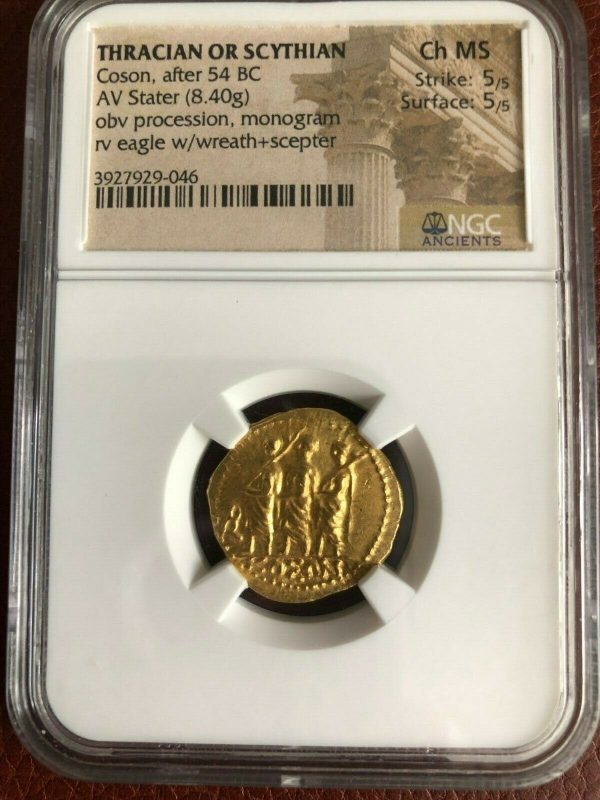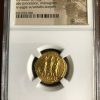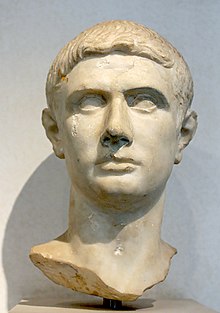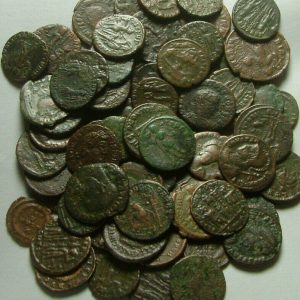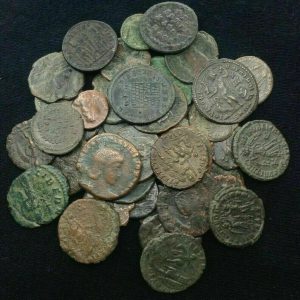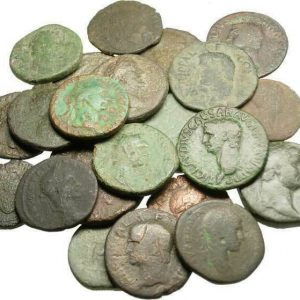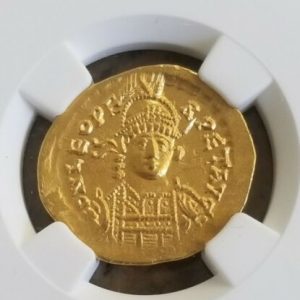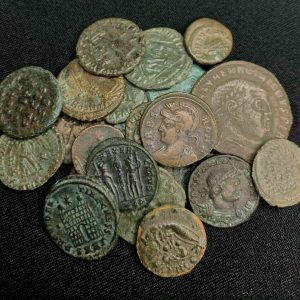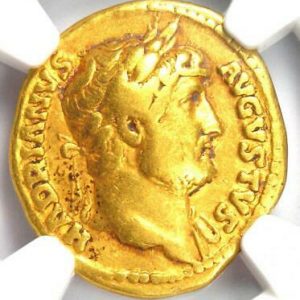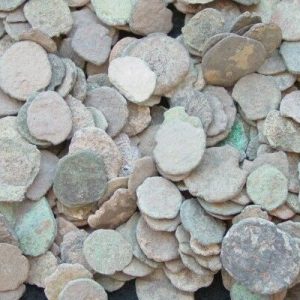- Description
Description
Authentic
Ancient Coin of:
Marcus Junius Brutus, Assassin of Julius Caesar
Gold Propaganda Coin with Obverse of his silver Coin from 54 B.C.
with his famous ancestor L. Brutus
Struck under:
Dynast of Thrace: Koson
Gold Stater 20mm (8.40 grams) Struck After 44 B.C.
Reference: RPC 1701; BMC Thrace pg. 208, 2; BMCRR II pg. 474, 48
Certification: NGC Ancients Ch MS Strike: 5/5 Surface: 5/5
3927929-046
KOΣΩΝ, Roman consul accompanied by two lictors; BR monogram to left
Eagle standing left on sceptre, holding wreath.
Koson: Golden Ally of Brutus
Marcus Junius Brutus and C. Cassius Longinus left for Greece in August of 44
BC, having failed to win popular support at Rome following the assassination of
Caesar. In the next two years the tyrannicides collected an immense war chest
as they assembled their forces for the contest against Antony and Octavian. The
historian Appian (Bell. Civ. IV. 75) tells us that L. Brutus struck from the
treasures consigned to him by Polemocratia, the widow of the Thracian dynast
Sadalas. Although the identity of the ‘Koson’ named on the coins
remains uncertain, the coinage in his name must be the coinage of L. Brutus
described by Appian. The obverse depicts the great consul L. Junius Brutus, who
expelled the Tarquins from Rome in 509 BC, accompanied by two lictors bearing
axes. The design is copied from the denarius issued by M. Junius Brutus when he
was a moneyer in 54 BC (Crawford 433/1). The reverse, an eagle standing on a
sceptre and holding a victory wreath, was evidently a standard type at Rome and
occurs on the coinage of Q. Pomponius Rufus (Crawford 398/1). The monogram is
to be read as BR or LBR (Brutus or L. Brutus). The designs express Brutus’ propaganda
in the civil war perfectly: the obverse represents the historic fight against
tyranny, and the reverse represents the victorious Roman eagle.
You
are bidding on the exact item pictured provided with a Certificate of
Authenticity.
Lucius Junius Brutus was the founder of the Roman Republic and
traditionally one of the first consuls in 509 BC. He was claimed as an ancestor
of the Roman gens Junia, including Decimus Junius Brutus and Marcus Junius Brutus,
the most famous of Julius Caesar’s assassins.
Background
Prior to the establishment of the Roman Republic, Rome had been ruled by
kings. Brutus led the revolt that overthrew the last king, Lucius Tarquinius
Superbus, after the rape of the noblewoman (and kinswoman of Brutus) Lucretia
at the hands of Tarquin’s son Sextus Tarquinius. The account is from
Livy’s Ab urbe condita and deals with a point in the history
of Rome prior to reliable historical records (virtually all prior records were
destroyed by the Gauls when they sacked Rome under Brennus in 390 BC or 387
BC).
Overthrow of the MonarchyLucius Iunius Brutus, on
right

Main article: Overthrow of the Roman monarchy
Brutus was the son of Tarquinia, daughter of Rome’s fifth king Lucius
Tarquinius Priscus and sister to Rome’s seventh king Tarquinius Superbus.
According to Livy, Brutus had a number of grievances against his uncle the
king, amongst them was the fact that Tarquin had put to death a number of the
chief men of Rome, including Brutus’ brother. Brutus avoided the distrust of
Tarquin’s family by feigning slow-wittedness (in Latin brutustranslates
to dullard).
He accompanied Tarquin’s sons on a trip to the Oracle of Delphi. The sons
asked the oracle who would be the next ruler of Rome. The Oracle responded the
next person to kiss his mother would become king. Brutus interpreted
‘mother’ to mean the Earth, so he pretended to trip and kissed the
ground.
Brutus, along with Spurius Lucretius Tricipitinus, Publius Valerius
Publicola, and Lucius Tarquinius Collatinus were summoned by Lucretia to
Collatia after she had been raped by Sextus Tarquinius, the son of the king
Tarquinius Superbus. Lucretia, believing that the rape dishonored her and her
family, committed suicide by stabbing herself with a dagger after telling of
what had befallen her. According to legend, Brutus grabbed the dagger from
Lucretia’s breast after her death and immediately shouted for the overthrow of
the Tarquins.
The four men gathered the youth of Collatia, then went to Rome where Brutus,
being at that time Tribunus Celerum, summoned the people to the
forum and exhorted them to rise up against the king. The people voted for the
deposition of the king, and the banishment of the royal family.
Brutus, leaving Lucretius in command of the city, proceeded with armed men
to the Roman army then camped at Ardea. The king, who had been with the army,
heard of developments at Rome, and left the camp for the city before Brutus’
arrival. The army received Brutus as a hero, and the king’s sons were expelled
from the camp. Tarquinius Superbus, meanwhile, was refused entry at Rome, and
fled with his family into exile.
The Oath of Brutus
According to Livy, Brutus’ first act after the expulsion of Lucius
Tarquinius Superbus was to bring the people to swear an oath never to allow any
man again to be king in Rome.
Omnium primum avidum novae libertatis populum, ne
postmodum flecti precibus aut donis regiis posset, iure iurando adegit neminem
Romae passuros regnare.First of all, by swearing an oath that they would
suffer no man to rule Rome, it forced the people, desirous of a new liberty,
not to be thereafter swayed by the entreaties or bribes of kings.
This is, fundamentally, a restatement of the ‘private oath’ sworn by the
conspirators to overthrow the monarchy:
Per hunc… castissimum ante regiam iniuriam sanguinem
iuro, vosque, di, testes facio me L. Tarquinium Superbum cum scelerata coniuge
et omni liberorum stirpe ferro igni quacumque dehinc vi possim exsecuturum, nec
illos nec alium quemquam regnare Romae passurum.By this guiltless blood
before the kingly injustice I swear – you and the gods as my witnesses
– I make myself the one who will prosecute, by what force I am able,
Lucius Tarquinius Superbus along with his wicked wife and the whole house of
his freeborn children by sword, by fire, by any means hence, so that neither
they nor any one else be suffered to rule Rome.
There is no scholarly agreement that the oath took place; it is reported,
although differently, by Plutarch (Poplicola, 2) and Appian (B.C. 2.119).
Consulship and death
Brutus and Lucretia’s bereaved husband, Lucius Tarquinius Collatinus, were
elected as the first consuls of Rome (509 BC). However, Tarquinius was soon
replaced by Publius Valerius Publicola. Brutus’ first acts during his
consulship, according to Livy, included administering an oath to the people of
Rome to never again accept a king in Rome (see above) and replenishing the
number of senators to 300 from the principal men of the equites. The new
consuls also created a new office of rex sacrorum to carry out the religious
duties that had previously been performed by the kings.
During his consulship the royal family made an attempt to regain the throne,
firstly by their ambassadors seeking to subvert a number of the leading Roman
citizens in the Tarquinian conspiracy. Amongst the conspirators were two
brothers of Brutus’ wife Vitellia, and Brutus’ two sons, Titus Junius Brutus
and Tiberius Junius Brutus. The conspiracy was discovered and the consuls
determined to punish the conspirators with death. Brutus gained respect for his
stoicism in watching the execution of his own sons, even though he showed
emotion during the punishment.
Tarquin again sought to retake the throne soon after at the Battle of Silva
Arsia, leading the forces of Tarquinii and Veii against the Roman army.
Valerius led the infantry, and Brutus led the cavalry. Aruns, the king’s son,
led the Etruscan cavalry. The cavalry first joined battle and Aruns, having
spied from afar the lictors, and thereby recognizing the presence of a consul,
soon saw that Brutus was in command of the cavalry. The two men, who were
cousins, charged each other, and speared each other to death. The infantry also
soon joined the battle, the result being in doubt for some time. The right wing
of each army was victorious, the army of Tarquinii forcing back the Romans, and
the Veientes being routed. However the Etruscan forces eventually fled the
field, the Romans claiming the victory.
The surviving consul, Valerius, after celebrating a triumph for the victory,
held a funeral for Brutus with much magnificence. The Roman noblewomen mourned
him for one year, for his vengeance of Lucretia’s violation.
Brutus in literature and art
The Lictors Bring to
Brutus the Bodies of His Sons by David, 1789

Lucius Junius Brutus is quite prominent in English literature, and he was
quite popular among British and American Whigs.
A reference to L. J. Brutus is in the following lines from Shakespeare’s
play The Tragedie of Julius Cæsar, (Cassius to Marcus Brutus, Act
1, Scene 2).
‘O, you and I have heard our fathers say,There was a
Brutus once that would have brooktTh’eternal devil to keep his state in RomeAs
easily as a king.’
One of the main charges of the senatorial faction that plotted against
Julius Caesar after he had the Roman Senate declare him dictator for life, was
that he was attempting to make himself a king, and a co-conspirator Cassius,
enticed Brutus’ direct descendant, Marcus Junius Brutus, to join the conspiracy
by referring to his ancestor.
L. J. Brutus is a leading character in Shakespeare’s Rape of Lucrece and
in Nathaniel Lee’s Restoration tragedy (1680), Lucius Junius Brutus;
Father of his Country.
In The Mikado, Nanki-poo refers to his father as ‘the
Lucius Junius Brutus of his race’.
The memory of L. J. Brutus also had a profound impact on Italian patriots,
including those who established the ill-fated Roman Republic in February 1849.
Brutus was a hero of republicanism during the Enlightenment and Neoclassical
periods. In 1789, at the dawn of the French Revolution, master painter
Jacques-Louis David publicly exhibited his politically charged
masterwork, The Lictors Bring to Brutus the Bodies of His Sons, to
great controversy.
See also
- Junia
(gens) - Junius
Marcus Junius Brutus (early June, 85 BC – late October,
42 BC), often referred to as Brutus, was a politician of the
late Roman Republic. After being adopted by his uncle he used the name Quintus
Servilius Caepio Brutus, but eventually returned to using his original
name.
He is best known in modern times for taking a leading role in the
assassination of Julius Caesar.
Early life
Marcus Junius Brutus the Younger was the son of Marcus Junius Brutus the
Elder and Servilia Caepionis. His father was killed by Pompey the Great in
dubious circumstances after he had taken part in the rebellion of Lepidus; his
mother was the half-sister of Cato the Younger, and later Julius Caesar’s
mistress. Some sources refer to the possibility of Caesar being his real
father, despite Caesar’s being only 15 years old when Brutus was born.
Brutus’ uncle, Quintus Servilius Caepio, adopted him in about 59 BC,
and Brutus was known officially for a time as Quintus Servilius Caepio Brutus
before he reverted to using his birth-name. Following Caesar’s assassination in
44 BC, Brutus revived his adoptive name in order to illustrate his links
to another famous tyrannicide, Gaius Servilius Ahala, from whom he was
descended.
Brutus held his uncle in high regard and his political career started when
he became an assistant to Cato, during his governorship of Cyprus. During this
time, he enriched himself by lending money at high rates of interest. He
returned to Rome a rich man, where he married Claudia Pulchra. From his first
appearance in the Senate, Brutus aligned with the Optimates (the conservative
faction) against the First Triumvirate of Marcus Licinius Crassus, Gnaeus
Pompeius Magnus and Gaius Julius Caesar.
Senate career
When civil war broke out in 49 BC between Pompey and Caesar, Brutus followed
his old enemy and present leader of the Optimates, Pompey. When the Battle of
Pharsalus began, Caesar ordered his officers to take Brutus prisoner if he gave
himself up voluntarily, and if he persisted in fighting against capture, to let
him alone and do him no violence.
After the disaster of the Battle of Pharsalus, Brutus wrote to Caesar with
apologies and Caesar immediately forgave him. Caesar then accepted him into his
inner circle and made him governor of Gaul when he left for Africa in pursuit
of Cato and Metellus Scipio. In 45 BC, Caesar nominated Brutus to serve as
urban praetor for the following year.
Also, in June 45 BC, Brutus divorced his wife and married his first cousin,
Porcia Catonis, Cato’s daughter. According to Cicero the marriage caused a
semi-scandal as Brutus failed to state a valid reason for his divorce from
Claudia other than he wished to marry Porcia. The marriage also caused a rift
between Brutus and his mother, who resented the affection Brutus had for Porcia.
Assassination of Julius Caesar (44 BC)
Main article: Assassination of Julius Caesar
Death of Caesar by Vincenzo Camuccini.

Around this time, many senators began to fear Caesar’s growing power
following his appointment as dictator for life. Brutus was persuaded into
joining the conspiracy against Caesar by the other senators. Eventually, Brutus
decided to move against Caesar after Caesar’s king-like behavior prompted him
to take action. His wife was the only woman privy to the plot.
The conspirators planned to carry out their plot on the Ides of March (March
15) that same year. On that day, Caesar was delayed going to the Senate because
his wife, Calpurnia Pisonis, tried to convince him not to go. The conspirators
feared the plot had been found out. Brutus persisted, however, waiting for
Caesar at the Senate, and allegedly still chose to remain even when a messenger
brought him news that would otherwise have caused him to leave.
When Caesar finally did come to the Senate, they attacked him. Publius
Servilius Casca Longus was allegedly the first to attack Caesar with a blow to
the shoulder, which Caesar blocked. However, upon seeing Brutus was with the
conspirators, he covered his face with his toga and resigned himself to his
fate. The conspirators attacked in such numbers that they even wounded one
another. Brutus is said to have been wounded in the hand and in the legs.
Marcus Junius Brutus.
After the assassination, the Senate passed an amnesty on the assassins. This
amnesty was proposed by Caesar’s friend and co-consul Marcus Antonius.
Nonetheless, uproar among the population caused Brutus and the conspirators to
leave Rome. Brutus settled in Crete from 44 to 42 BC.
In 43 BC, after Octavian received his consulship from the Roman Senate, one
of his first actions was to have the people that had assassinated Julius Caesar
declared murderers and enemies of the state. Marcus Tullius Cicero, angry at
Octavian, wrote a letter to Brutus explaining that the forces of Octavian and
Marcus Antonius were divided. Antonius had laid siege to the province of Gaul,
where he wanted a governorship. In response to this siege, Octavian rallied his
troops and fought a series of battles in which Antonius was defeated.
Battle of Philippi (42 BC)
Upon hearing that neither Antonius nor Octavian had an army big enough to
defend Rome, Brutus rallied his troops, which totaled about 17 legions. When
Octavian heard that Brutus was on his way to Rome, he made peace with Antonius.
Their armies, which together totaled about 19 legions, marched to meet Brutus
and Gaius Cassius Longinus. The two sides met in two engagements known as the
Battle of Philippi. The first was fought on October 3, 42 BC, in
which Brutus defeated Octavian’s forces, although Cassius was defeated by
Antonius’ forces. The second engagement was fought on October 23,
42 BC and ended in Brutus’ defeat.
After the defeat, he fled into the nearby hills with only about four
legions. Knowing his army had been defeated and that he would be captured,
Brutus committed suicide. Among his last words were, according to Plutarch,
‘By all means must we fly; not with our feet, however, but with our
hands.’ Brutus also uttered the well-known verse calling down a curse upon
Antonius (Plutarch repeats this from the memoirs of Publius Volumnius): Forget
not, Zeus, the author of these crimes(in the Dryden translation this
passage is given as Punish, great Jove, the author of these ills).
Plutarch wrote that, according to Volumnius, Brutus repeated two verses, but
Volumnius was only able to recall the one quoted.
Antonius, as a show of great respect, ordered Brutus’ body to be wrapped in
Antonius’ most expensive purple mantle (this was later stolen and Antonius had
the thief executed). Brutus was cremated, and his ashes were sent to his
mother, Servilia Caepionis. His wife Porcia was reported to have committed
suicide upon hearing of her husband’s death, although, according to Plutarch (Brutus
53 para 2), there is some dispute as to whether this is the case: Plutarch
states that there is a letter in existence that was allegedly written by Brutus
mourning the manner of her death.
Chronology
- 85 BC:
Brutus was born in Rome to Marcus Junius Brutus The Elder and Servilia
Caepionis. - 58 BC: He
was made assistant to Cato, governor of Cyprus which helped him start his
political career. - 53 BC: He
was given the quaestorship in Cilicia. - 49 BC:
Brutus followed Pompey to Greece during the civil war against Caesar. - 48 BC:
Brutus was pardoned by Caesar. - 46 BC: He
was made governor of Gaul. - 45 BC: He
was made Praetor. - 44 BC:
Murdered Caesar with other liberatores; went to Athens and then to Crete. - 42 BC:
Battle with Marcus Antonius’s forces.
Legacy
This was the noblest Roman of them all:
All the conspirators save only he
Did that they did in envy of great Caesar;
He only, in a general honest thought
And common good to all, made one of them.
His life was gentle, and the elements
So mix’d in him that Nature might stand up
And say to all the world ‘This was a man!’
William Shakespeare, Julius Caesar, Act 5, Scene 5
(Mark Antony)
Influence
- The
phrase Sic semper tyrannis! [‘thus, ever (or
always), to tyrants!’] is attributed to Brutus at Caesar’s
assassination. The phrase is also the official motto of the Commonwealth
of Virginia. - John
Wilkes Booth, the assassin of Abraham Lincoln, claimed to be inspired by
Brutus. Booth’s father, Junius Brutus Booth, was named for Brutus, and
Booth (as Marcus Antonius) and his brother (as Brutus) had performed in a
production of Julius Caesar in New York just six months
before the assassination. On the night of the assassination, Booth is
alleged to have shouted ‘Sic semper tyrannis’ while leaping to
the stage of Ford’s Theater. Lamenting the negative reaction to his deed,
Booth wrote in his journal on April 21, 1865, while on the run,
‘[W]ith every man’s hand against me, I am here in despair. And why;
For doing what Brutus was honored for … And yet I for striking down a
greater tyrant than they ever knew am looked upon as a common
cutthroat.’ Booth was also known to be greatly attracted to Caesar
himself, having played both Brutus and Caesar upon various stages. - The
well-known phrase ‘Et tu, Brute?’ (‘And you, Brutus?’)
is famous as Caesar’s utterance in the play Julius Caesar, although it is
not his last words, and the sources describing Caesar’s death disagree
about what his last words were.
Fiction
- In
Dante’s Inferno, Brutus is one of three people deemed sinful
enough to be chewed in one of the three mouths of Satan, in the very
center of Hell, for all eternity. The other two are Cassius, who was
Brutus’s fellow conspirator and Judas Iscariot (Canto XXXIV). Dante
condemned these three in the afterlife for being Treacherous Against Their
Masters and enemies of the King/Emperor. - Shakespeare’s
play Julius Caesar depicts Caesar’s assassination by
Brutus and his accomplices, and the murderers’ subsequent downfall. In the
final scene, Marcus Antonius describes Brutus as ‘the noblest Roman
of them all’, for he was the only conspirator who acted for the good
of Rome. - In
the Masters of Rome novels of Colleen McCullough, Brutus
is portrayed as a timid intellectual who hates Caesar for personal
reasons, foremost of them the fact that his marriage arrangement with
Caesar’s daughter, Julia, whom Brutus deeply loved, was dissolved in
Caesar’s political gamble to give his daughter’s hand to Pompey to cement
with him an alliance. Cassius and Trebonius use him as a figurehead
because of his family connections, and his descendence from the founder of
the Republic. He appears in Fortune’s Favourites, Caesar’s
Women, Caesar and The October Horse. - Ides of
March is an epistolatory novel by Thornton Wilder dealing with
characters and events leading to, and culminating in, the assassination of
Julius Caesar. - In the TV
series Rome, Brutus, portrayed by Tobias Menzies, is depicted
as a young man torn between what he believes is right, and his loyalty and
love of a man who has been like a father to him. In the series, his
personality and motives are accurate but Brutus’ relationship to Cassius
and Cato is not mentioned, and his three sisters and wife Porcia are
omitted from the series completely. - Brutus is
an occasional supporting character in Asterix comics, most notably Asterix
and Sonin which he is the main antagonist. The character appears in
the live Asterix film adaptations – though briefly in the first two
– Asterix and Obelix vs Caesar (played by Didier Cauchy)
and Asterix at the Olympic Games. In the latter film, he is
portrayed as a comical villain by Belgian actor Benoît Poelvoorde: he is a
central character to the film, even though he was not depicted in the
original Asterix at the Olympic Games comic book. Following sources cited
in Plutarch, he is implied in that film to be Julius Caesar’s biological
son. - The Hives’
song ‘B is for Brutus’ contains titular and lyrical references
to Junius Brutus.
The Roman Republic was the phase of the ancient Roman
civilization characterized by a republican form of government. It began with
the overthrow of the Roman monarchy, c. 509 BC, and lasted over 450 years until
its subversion, through a series of civil wars, into the Principate form of
government and the Imperial period.
The Roman Republic was governed by a complex constitution, which centered on
the principles of a separation of powers and checks and balances. The evolution
of the constitution was heavily influenced by the struggle between the
aristocracy (the patricians), and other talented Romans who were not from
famous families, the plebeians. Early in its history, the republic was controlled
by an aristocracy of individuals who could trace their ancestry back to the
early history of the kingdom. Over time, the laws that allowed these
individuals to dominate the government were repealed, and the result was the
emergence of a new aristocracy which depended on the structure of society,
rather than the law, to maintain its dominance.
During the first two centuries, the Republic saw its territory expand from
central Italy to the entire Mediterranean world. In the next century, Rome grew
to dominate North Africa, the Iberian Peninsula, Greece, and what is now
southern France. During the last two centuries of the Roman Republic, it grew
to dominate the rest of modern France, as well as much of the east. At this
point, the republican political machinery was replaced with imperialism.
The precise event which signaled the end of the Roman Republic and the
transition into the Roman Empire is a matter of interpretation. Towards the end
of the period a selection of Roman leaders came to so dominate the political
arena that they exceeded the limitations of the Republic as a matter of course.
Historians have variously proposed the appointment of Julius Caesar as
perpetual dictator in 44 BC, the defeat of Mark Antony at the Battle of Actium
in 31 BC, and the Roman Senate’s grant of extraordinary powers to Octavian
(Augustus) under the first settlement in 27 BC, as candidates for the defining
pivotal event ending the Republic.
Many of Rome’s legal and legislative structures can still be observed
throughout Europe and the rest of the world by modern nation state and
international organizations. The Romans’ Latin language has influenced grammar
and vocabulary across parts of Europe and the world.
Certificate of authenticity
This coin comes with a Certificate of Authenticity. You will be very happy with what you get with the COA; a professional presentation of the coin, with all of the relevant information and a picture of the coin you saw in the listing. Additionally, the coin is inside it’s own protective coin flip (holder), with a 2×2 inch description of the coin matching the individual number on the COA.
On the free-market such a presentation alone, can be considered a $25-$50 value all in itself, and it comes standard with your purchases from me, FREE.
This coin comes with a Certificate of Authenticity. You will be very happy with what you get with the COA; a professional presentation of the coin, with all of the relevant information and a picture of the coin you saw in the listing. Additionally, the coin is inside it’s own protective coin flip (holder), with a 2×2 inch description of the coin matching the individual number on the COA.
On the free-market such a presentation alone, can be considered a $25-$50 value all in itself, and it comes standard with your purchases from me, FREE.

